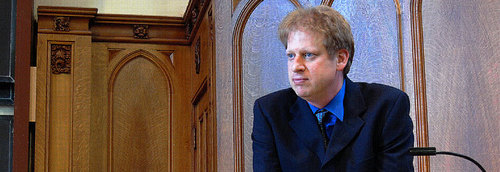
一口气看完了,很久没有读心理学的书籍,这次算是再补课。Paul Bloom教授毕业于Macgill大学,曾在MIT工作,对少儿心理学很有研究。听他的演讲很轻松,没有那么多心理学术语,同时会列举大量形象的例子来讲解,受益匪浅。
About the Course
What do your dreams mean? Do men and women differ in the nature and intensity of their sexual desires? Can apes learn sign language? Why can’t we tickle ourselves? This course tries to answer these questions and many others, providing a comprehensive overview of the scientific study of thought and behavior. It explores topics such as perception, communication, learning, memory, decision-making, religion, persuasion, love, lust, hunger, art, fiction, and dreams. We will look at how these aspects of the mind develop in children, how they differ across people, how they are wired-up in the brain, and how they break down due to illness and injury.
About Professor Paul Bloom
Paul Bloom is Professor of Psychology at Yale University. He was born in Montreal, Canada, was an undergraduate at McGill University, and did his doctoral work at MIT. He has published in scientific journals such as Nature and Science, and in popular outlets such as The New York Times and The Atlantic Monthly. He is the co-editor of Behavioral and Brain Sciences, and the author of two books: How Children Learn the Meanings of Words and Descartes' Baby: How the Science of Child Development Explains What Makes Us Human. His research explores children's understanding of art, religion, and morality.
课程内容:
1. 绪论 (Introduction)
【视频一】 【视频二】
2. 大脑 (Foundations: This Is Your Brain)
【视频一】 【视频二】 【视频三】
3. 心理学创始人-西格蒙德·弗洛伊德 (Foundations: Freud)
【视频一】 【视频二】 【视频三】
4. 美国行为主义心理学家-B.F.斯金纳 (Foundations: Skinner)
【视频一】 【视频二】 【视频三】
5. 思维的发展 (What Is It Like to Be a Baby: The Development of Thought)
【视频一】 【视频二】 【视频三】
6. 人类交流的途径:大脑,口部及手部语言 (How Do We Communicate?: Language in the Brain, Mouth and the Hands)
【视频一】 【视频二】 【视频三】
7. 现在意识和过去意识:语言,想象与记忆 (Conscious of the Present; Conscious of the Past: Language (cont.); Vision and Memory)
【视频一】 【视频二】 【视频三】
8. 现在意识和过去意识:想象与记忆 (Conscious of the Present; Conscious of the Past: Vision and Memory (cont.))
【视频一】 【视频二】 【视频三】
9. 演变,情感与理性:爱 (Evolution, Emotion, and Reason: Love (Guest Lecture by Professor Peter Salovey))
【视频一】 【视频二】 【视频三】
10. 演变,情感与理性:演变与合理性 (Evolution, Emotion, and Reason: Evolution and Rationality)
【视频一】 【视频二】 【视频三】
11. 演变,情感与理性:情感 (Evolution, Emotion, and Reason: Emotions, Part I)
【视频一】 【视频二】 【视频三】
12. 演变,情感与理性:情感 (续)(Evolution, Emotion, and Reason: Emotions, Part II)
【视频一】 【视频二】 【视频三】
13. 人与人之间的差异 (Why Are People Different?: Differences)
【视频一】 【视频二】 【视频三】
14. 心理学: 性 (What Motivates Us: Sex)
【视频一】 【视频二】 【视频三】
15. 心理学: 道德 (A Person in the World of People: Morality)
【视频一】 【视频二】 【视频三】
16. 心理学: 自我和他人 (A Person in the World of People: Self and Other, Part I)
【视频一】 【视频二】 【视频三】
17. 自我和他人 (续) (A Person in the World of People: Self and Other, Part II; Some Mysteries: Sleep, Dreams, and Laughter)
【视频一】 【视频二】 【视频三】
18. 心理学: 精神病 (What Happens When Things Go Wrong: Mental Illness, Part I (Guest Lecture by Professor Susan Nolen-Hoeksema))
【视频一】 【视频二】 【视频三】
19. 心理学: 精神病 (续)(What Happens When Things Go Wrong: Mental Illness, Part II)
【视频一】 【视频二】 【视频三】
20. 心理学: 美好生活:幸福 (The Good Life: Happiness)
【视频一】 【视频二】 【视频三】






